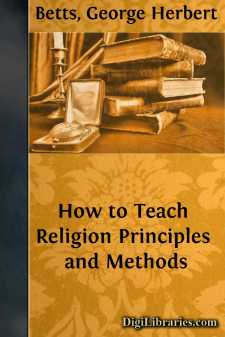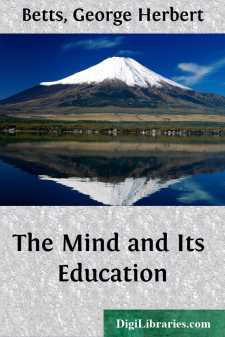Categories
- Antiques & Collectibles 13
- Architecture 36
- Art 48
- Bibles 22
- Biography & Autobiography 813
- Body, Mind & Spirit 142
- Business & Economics 28
- Children's Books 15
- Children's Fiction 12
- Computers 4
- Cooking 94
- Crafts & Hobbies 4
- Drama 346
- Education 46
- Family & Relationships 57
- Fiction 11828
- Games 19
- Gardening 17
- Health & Fitness 34
- History 1377
- House & Home 1
- Humor 147
- Juvenile Fiction 1873
- Juvenile Nonfiction 202
- Language Arts & Disciplines 88
- Law 16
- Literary Collections 686
- Literary Criticism 179
- Mathematics 13
- Medical 41
- Music 40
- Nature 179
- Non-Classifiable 1768
- Performing Arts 7
- Periodicals 1453
- Philosophy 64
- Photography 2
- Poetry 896
- Political Science 203
- Psychology 42
- Reference 154
- Religion 513
- Science 126
- Self-Help 84
- Social Science 81
- Sports & Recreation 34
- Study Aids 3
- Technology & Engineering 59
- Transportation 23
- Travel 463
- True Crime 29
How to Teach Religion Principles and Methods
Description:
Excerpt
CHAPTER I
THE TEACHER HIMSELF
It is easy enough to secure buildings and classrooms for our schools. The expenditure of so many dollars will bring us the equipment we require. Books and materials may be had almost for the asking. The great problem is to secure teachers—real teachers, teachers of power and devotion who are able to leave their impress on young lives. Without such teachers all the rest is but as sounding brass or a tinkling cymbal. And to be a real teacher is a very high achievement.
Bishop Vincent was giving a lecture on "That Boy." He himself was "that boy," and in the course of describing his school days he fell into meditation as follows: "That old school master of mine!—He is dead now—and I have forgiven him!—And I am afraid that was the chronology of the matter; for I never was able to forgive him while he lived." I, as one of the listeners, smiled at the bitter wit of the speaker, but was oppressed.
This somber view of the impression sometimes left by teachers on their pupils received an antidote the following day, however, when a venerable old man approached my desk bearing in his hands an ancient and dog-eared copy of a text in grammar. He opened the book and proudly showed me written across the fly leaf "Grover Cleveland, President." Then he told me this story:
"I have been a teacher. In one of my first schools I had Grover Cleveland as a pupil. He came without a textbook in grammar, and I loaned him mine. Years passed, and Grover Cleveland was President of the United States. One day I was one of many hundreds passing in line at a public reception to grasp the President's hand. I carried this book with me, and when it came my turn to meet the President, I presented the volume and said, 'Mr. President, do you recognize this book, and do you remember me?' In an instant the light of recognition had flashed in Mr. Cleveland's eyes. Calling me by name, he grasped my hand and held it while the crowd waited and while he recalled old times and thanked me for what I had meant to him when I was his teacher. Then he took the old book and autographed it for me."
—Two types of teachers are remembered: one to be forgiven after years have softened the antagonisms and resentments; the other to be thought of with honor and gratitude as long as memory lasts. Between these two is a third and a larger group: those who are forgotten, because they failed to stamp a lasting impression on their pupils. This group represents the mediocrity of the profession, not bad enough to be actively forgiven, not good enough to claim a place in gratitude and remembrance.
To which type would we belong? To which type can we belong? Can we choose? What are the factors that go to determine the place we shall occupy in the scale of teachers?
THE PERSONAL FACTOR
When we revert to our own pupil days we find that the impressions which cling to our memories are not chiefly impressions of facts taught and of lessons learned, but of the personality of the teacher. We may have forgotten many of the truths presented and most of the conclusions drawn, but the warmth and glow of the human touch still remains.
To be a teacher of religion requires a particularly exalted personality. The teacher and the truth taught should always leave the impression of being of the same pattern. "For their sakes I sanctify myself," said the Great Teacher; shall the teachers of his Word dare do less!
—This is not to say that the subject matter taught is unimportant, nor that the lessons presented are immaterial. It is only to say that life responds first of all to life. Truth never comes to the child disembodied and detached, but always with the slant and quality of the teacher's interpretation of it. It is as if the teacher's mind and spirit were the stained glass through which the sunlight must fall; all that passes through the medium of a living personality takes its tone and quality from this contact. The pupils may or may not grasp the lessons of their books, but their teachers are living epistles, known and read by them all.
For it is the concrete that grips and molds. Our greatest interest and best attention center in persons. The world is neither formed nor reformed by abstract truths nor by general theories. Whatever ideals we would impress upon others we must first have realized in ourselves. What we are often drowns out what we say....





